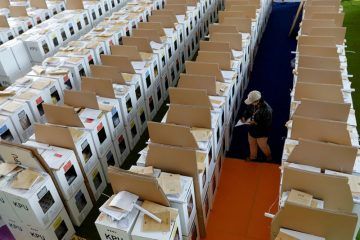Editors in Nature:
 Since Nature’s earliest issues, we have been publishing news, commentary and primary research on science and politics. But why does a journal of science need to cover politics? It’s an important question that readers often ask.
Since Nature’s earliest issues, we have been publishing news, commentary and primary research on science and politics. But why does a journal of science need to cover politics? It’s an important question that readers often ask.
This week, Nature reporters outline what the impact on science might be if Joe Biden wins the US presidential election on 3 November, and chronicle President Donald Trump’s troubled legacy for science. We plan to increase politics coverage from around the world, and to publish more primary research in political science and related fields. Science and politics have always depended on each other. The decisions and actions of politicians affect research funding and research-policy priorities. At the same time, science and research inform and shape a spectrum of public policies, from environmental protection to data ethics. The actions of politicians affect the higher-education environment, too. They can ensure that academic freedom is upheld, and commit institutions to work harder to protect equality, diversity and inclusion, and to give more space to voices from previously marginalized communities. However, politicians also have the power to pass laws that do the opposite.
…Perhaps even more troubling are signs that politicians are pushing back against the principle of protecting scholarly autonomy, or academic freedom. This principle, which has existed for centuries — including in previous civilizations — sits at the heart of modern science. Today, this principle is taken to mean that researchers who access public funding for their work can expect no — or very limited — interference from politicians in the conduct of their science, or in the eventual conclusions at which they arrive. And that, when politicians and officials seek advice or information from researchers, it is on the understanding that they do not get to dictate the answers. This is the basis for today’s covenant between science and politics, and it applies across a range of research, education, public-policy and regulatory domains.
More here.
